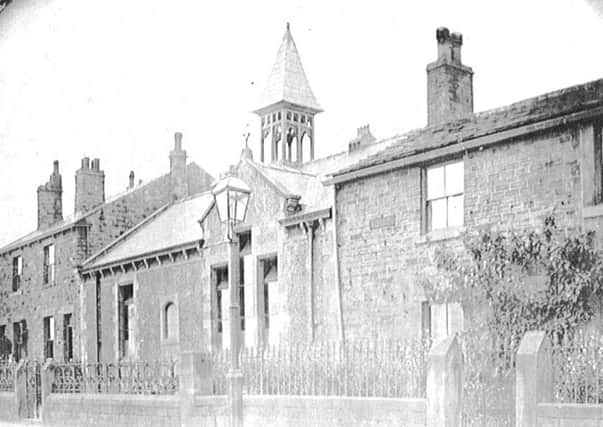The Nostalgia column with Margaret Watson: A memorial for Richard Walker


Well that is exactly what a small community group in Thornhill have been doing these last six years.
The group came together after the Walker Welfare Centre in Thornhill was demolished leaving the village bereft of yet another village landmark.
Advertisement
Hide AdAdvertisement
Hide AdThe centre was originally built as a school 200 years ago by Richard Walker, a local farmer and landowner, to provide free education for poor children in the village.
News that the building was being demolished by Kirklees Council amid reports that it was falling into disrepair, angered local residents.
Public meetings were held in the village to prevent this happening, but sadly without success, and when it was demolished most villagers thought that would be the end of the matter.
But not so with this little group of campaigners who were as determined as ever to find some way of retaining part of their local history.
Advertisement
Hide AdAdvertisement
Hide AdThey set about trying to acquire the site on which the old school had once stood to erect a memorial garden to the memory of Richard Walker.
Unfortunately this too didn’t bear fruit because of lack of funding and not having the required constitution to enable them to get charity status.
This week I was delighted to hear that they have been given permission and assistance from Kirklees Council to erect a memorial on the site in Richard’s memory.
The Memorial will be of a substantial build, standing 2.5 metres by 1.5 metre, but more importantly, an ancient brass plaque belonging to the centre will be incorporated within the memorial build, as well as some of the stones from the old school.
Advertisement
Hide AdAdvertisement
Hide AdThe five people who first came together to preserve Richard Walker’s memory were: Alan Butcher, Carole Driver, Christine Hidle Pauline Friend and Margaret Nicholson, who has since sadly passed away.
This week Alan spoke to me of their determination to keep their campaign going.
He said: “We did it out of a deep desire to remember a man who had done so much for the poor children of Thornhill.”
They were concerned that much of the history of towns and villages like Thornhill was slowly being lost, but it was an achievement in itself they had managed to save a little of Thornhill’s history.
Advertisement
Hide AdAdvertisement
Hide AdMany will remember that when the Walker Welfare School closed, it became home to the Senior Citizens until its doors closed in 2007.
The history of Thornhill’s first free school is a fascinating one and shows how important it was for the village to have a benefactor like Richard Walker.
He gave a piece of his land and 10 cottages to the curate of Thornhill and 16 gentlemen on condition they used them to build a school and a schoolmaster’s house.
Any residue was to be used for the school’s upkeep,
He also handed over “outhouses, buildings, cellars, yards, courts, water courses, liberties, privileges etc” for the benefit of free education for Thornhill.
Advertisement
Hide AdAdvertisement
Hide AdRichard Walker did, however, lay down one important stipulation that the children be the offspring of “sober and industrious parents” and should be taught “reading, writing, arithmetic and no further”.
The only school in Thornhill prior to Richard’s school being built charged its pupils attendance fees which excluded children whose parents couldn’t afford to send them.
In 1837, the first master at the Richard Walker School was paid £40 a year.
By the year 1867 there were 57 boys and 13 girls attending, and the school soon outgrew itself and had to be enlarged.
Advertisement
Hide AdAdvertisement
Hide AdIt continued to grow and in 1888 it came under Government inspection.
At the time the school had 87 school places with an average attendance of 75, and was given a Government grant of £66.15s.6d.
I hope those reading this column will realise that our history can only be preserved if groups like this one in Thornhill are prepared to stick their necks out and do something about it.
They might be surprised how much help they will get from local councillors and officers if approached.
Advertisement
Hide AdAdvertisement
Hide AdSometimes it will entail having to go through a lot of red tape and lots of forms to fill in, but if you’re determined, like this little group, you can often achieve your goal.
Thinking about retaining Thornhill’s history, I would like to remind readers of a charity brass band concert which is being held to commemorate the Thornhill Combs Colliery Disaster of 1893 in which 139 men and boys lost their lives.
There is another small group working together at the moment to erect a memorial in memory of these men, and hopefully this will not be too long in the coming.
Please support this concert because it is commemorating an important part of our history.
Advertisement
Hide AdAdvertisement
Hide AdIt will be held on Saturday, July 13 in Dewsbury Town Hall, featuring Grimethorpe Colliery Band, accompanied by Skelmenthorpe Male Voice Choir.
All proceeds in aid of local charities.
Tickets £20 either online at www.kirkleestownhalls.co.uk or direct at Dewsbury Town Hall on 01924 324501.